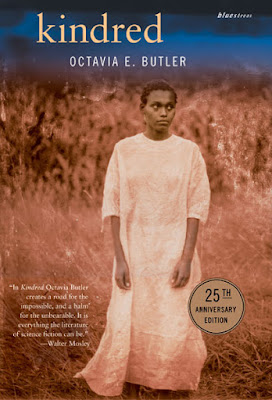The Mother of AfroFuturism: Octavia Butler
Born in Pasadena, California in June of 1947, Octavia Estelle Butler, was raised by her mother, a maid, and her father, who shined shoes for a living. When her father passed away when Octavia was seven years old, her grandmother helped to raise her. According to one source, Butler grew up with a painful shyness that made making friends difficult, and dyslexia, which made schoolwork even more difficult. She was often the target of teasing from bullies, but she found a haven in the public library, where she pored over Science Fiction magazines like Amazing Stories and The Magazine of Fantasy and Science Fiction. She determined that she would write her own stories, so she begged her mother for a typewriter for the purpose (1).
photo of Butler from tansyrr.com
Recipient of two Hugo Awards, two Nebula Awards, and the first Science Fiction writer to have received a MacArthur Fellowship, Octavia Butler was the first African American woman to have traversed the largely white male-dominated genre of Science Fiction (1). Her novels such as Kindred, The Parable Series, Patternist Series, and Xenogenesis Series have been praised as biting social criticism and commentary, told in terse, economical language. Butler's work often featured strong, solitary, black female protagonists, confronted by bleak and dystopian landscapes and fates that one might at first judge "insurmountable" (2).
In Kindred the author focuses on an African American woman who travels back in time to find herself living on the antebellum plantation of her great, great grandfather. In the vein of speculative fiction, which envisions alternate histories, Butler's narrative allows the reader to experience, with great immediacy, the horrific indignity of slavery and racism through her character. It is a story she was inspired by her mother to write. Butler is quoted in the New York Times as having said that "I didn't like seeing her go through back doors...If my mother put up with all those humiliations, I wouldn't have eaten very well or lived very comfortably. So I wanted to write a novel that would make others feel the history: the pain and fear that place people have had to live through in order to endure (2).
Though Butler did not categorize her work generically, she has been chiefly associated with the genres of Science Fiction and Afrofuturism--the latter term introduced by Mark Dery, who defines it as "speculative fiction that treats African American themes and addresses African-American concerns in the context of 20th century technoculture" (1). Her themes included the necessity for community cohesiveness, the heroic lone survivor, the "remaking of the human," as well as social critique. Butler also broke traditional barriers with narrative voice, often assuming a male, or ungendered narrative role.
Believed to have suffered a stroke and fallen at her home, Octavia Butler passed away at her home in Lake Forest Park, Washington after a long period of depression and illness. Only fifty-eight when she died, she left a significant legacy for new ways of envisioning the world, of treating topics like race, gender, class, and the specific questions confronting African Americans (and African American women) in the advancing technologically-dominated age (1).
photo of Butler from tansyrr.com
Recipient of two Hugo Awards, two Nebula Awards, and the first Science Fiction writer to have received a MacArthur Fellowship, Octavia Butler was the first African American woman to have traversed the largely white male-dominated genre of Science Fiction (1). Her novels such as Kindred, The Parable Series, Patternist Series, and Xenogenesis Series have been praised as biting social criticism and commentary, told in terse, economical language. Butler's work often featured strong, solitary, black female protagonists, confronted by bleak and dystopian landscapes and fates that one might at first judge "insurmountable" (2).
In Kindred the author focuses on an African American woman who travels back in time to find herself living on the antebellum plantation of her great, great grandfather. In the vein of speculative fiction, which envisions alternate histories, Butler's narrative allows the reader to experience, with great immediacy, the horrific indignity of slavery and racism through her character. It is a story she was inspired by her mother to write. Butler is quoted in the New York Times as having said that "I didn't like seeing her go through back doors...If my mother put up with all those humiliations, I wouldn't have eaten very well or lived very comfortably. So I wanted to write a novel that would make others feel the history: the pain and fear that place people have had to live through in order to endure (2).
Though Butler did not categorize her work generically, she has been chiefly associated with the genres of Science Fiction and Afrofuturism--the latter term introduced by Mark Dery, who defines it as "speculative fiction that treats African American themes and addresses African-American concerns in the context of 20th century technoculture" (1). Her themes included the necessity for community cohesiveness, the heroic lone survivor, the "remaking of the human," as well as social critique. Butler also broke traditional barriers with narrative voice, often assuming a male, or ungendered narrative role.
Believed to have suffered a stroke and fallen at her home, Octavia Butler passed away at her home in Lake Forest Park, Washington after a long period of depression and illness. Only fifty-eight when she died, she left a significant legacy for new ways of envisioning the world, of treating topics like race, gender, class, and the specific questions confronting African Americans (and African American women) in the advancing technologically-dominated age (1).





Comments
Post a Comment